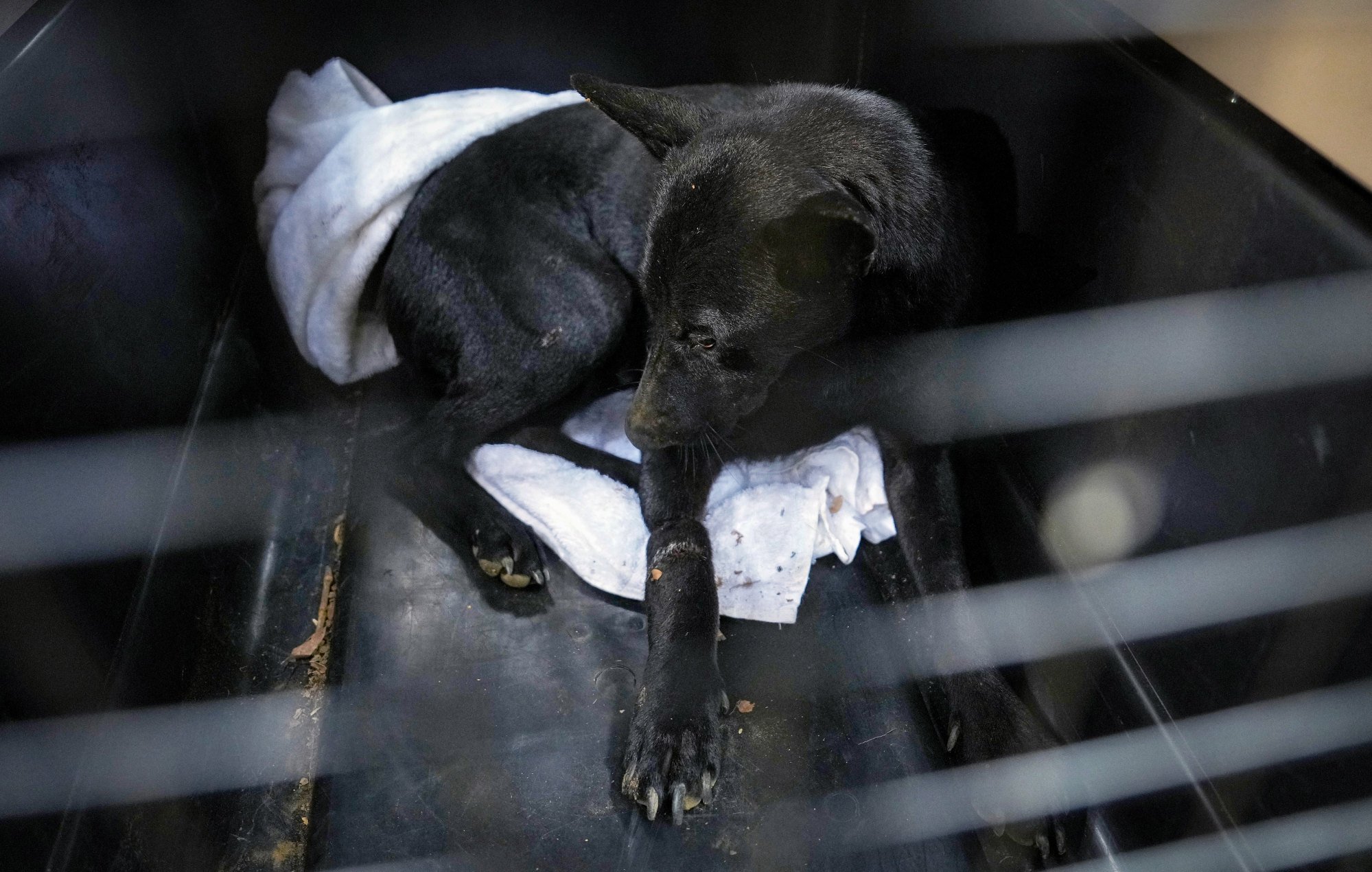Stray dogs often end up trapped and most are found alive but injured, he said. SPCA vets tended to the rescued animals and assess whether they were suitable for adoption after they healed.

The Post accompanied the group on a rescue mission on January 30, after it received a report of a stray dog trapped in the hills near Shing Mun Reservoir in Tsuen Wan.
Two SPCA officers abseiled down a slope to rescue the mongrel, which had its right front paw caught by a wire trap. It was whimpering with its right front leg swollen.
The team also found shredded bread, dried squid and fish hanging on a tree nearby, which it believed was left by poachers to attract wild boars.
On January 17, two dogs were found trapped within 10 metres (32.8 feet) of each other in Sha Tau Kok in northeastern New Territories, both with paws caught in traps.
SPCA officers rescued the dogs and found 12 illegal traps in the area, including many with metal wires and snares.
Chunks taken out of incense trees, poachers prowl as Hong Kong’s borders reopen
Chunks taken out of incense trees, poachers prowl as Hong Kong’s borders reopen
Tsang said the illegal traps were not only available online but also easy for poachers to carry and set up.
“The traps have become more minimal and can easily be bought online and hidden in their bags,” he said. “The new ones, which trap the animals’ legs, only require some metal springs, wires and worm gears to construct.
“It is not illegal to buy these parts, but when they are put together and built into a trap to cause hurt to animals, they breach the law.”
He believed the poachers’ main targets were wild boars, which they wanted for their meat.
Media reported last month that a villager in Loi Tung East Village was seen butchering wild boars believed to have been trapped illegally.
Hongkonger arrested over HK$7.4 million in laundered funds from wildlife trade
Hongkonger arrested over HK$7.4 million in laundered funds from wildlife trade
Last March, the Agriculture, Fisheries and Conservation Department found 11 cage traps on a hillside near Po Lam Estate in Tseung Kwan O.
A leopard cat was discovered ensnared in one of the cages and sent to the Kadoorie Farm and Botanic Garden.
A department spokesman said it had seized more than 750 hunting appliances in the past five years, including 137 last year.
The department prosecuted eight cases in 2021 with fines ranging between HK$400 (US$51) and HK$2,400, while five cases were prosecuted and ended in convictions in 2022, resulting in fines between HK$300 and HK$1,000, he said.
The department prosecuted two cases last year, and investigations were ongoing.

Unless a resident holds a special permit, it is illegal to possess any hunting appliance and hunt wild animals in Hong Kong, with offenders facing a maximum fine of HK$50,000.
The hunting of wild animals listed as protected species carries a maximum fine of HK$100,000 and one year’s jail time. Possessing and using hunting appliances are banned at country parks, and offenders face a maximum fine of HK$2,000 and three months in prison.
Porcupines, muntjac deer and leopard cats are considered protected wild animals, but not Hong Kong’s estimated 2,500 wild boars, said Roni Wong Ho-yin of the Wild Boars Concern Group.
Hong Kong’s illegal wildlife trade flourishing despite tougher enforcement powers
Hong Kong’s illegal wildlife trade flourishing despite tougher enforcement powers
Wong, whose group objects to culling, said villagers in rural areas had long been known to hunt boars, but the situation had worsened since the department action.
“We feel that since the government rolled out the wild boar cull, people have been taught to see them as our enemies and feel it is all right to take action against them,” Wong said.
“Of course in rural areas, there has been a tradition of farmers or villagers hunting wild boars for food, or trapping them to prevent them from digging up crops.”
He said villagers usually hunted wild boars for their own consumption or sold the meat to other villagers or local eateries that served wild game illegally.
Wong felt current penalties were not enough of a deterrent. “The government must raise the penalties, step up patrolling and actually enforce the law to target these illegal hunters,” he said.
HK$22 million in endangered wildlife items seized in Hong Kong anti-smuggling drive
HK$22 million in endangered wildlife items seized in Hong Kong anti-smuggling drive
The conservation department said it had not received reports of restaurants selling boar meat hunted locally.
Ibrahim Elsohaby, an assistant professor at the department of infectious diseases and public health at City University, said that wild pigs were a significant source of diseases transmitted from animals to humans.
They were known to carry about 30 viral and bacterial diseases and almost 40 parasites, posing the risk of transmission to people, pets, livestock and other wildlife, he said.
Eating undercooked wild boar meat was a common way for disease-causing viruses and parasites to pass to people, causing swine flu, salmonella and some life-threatening conditions.
The health risks multiplied when poachers retrieved trapped animals long after they had died and begun decomposing, he said.
